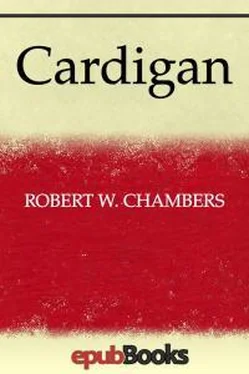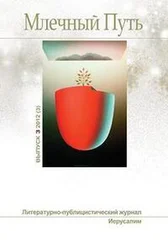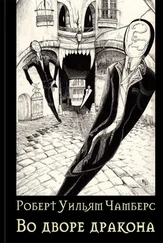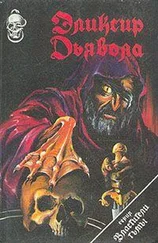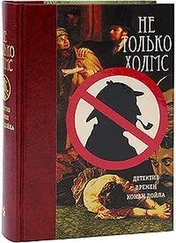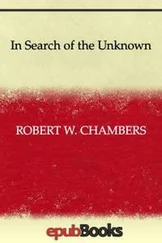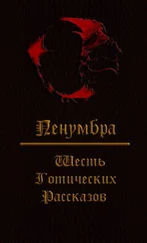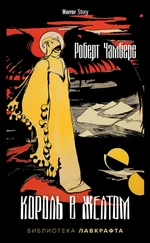Роберт Чамберс - Cardigan
Здесь есть возможность читать онлайн «Роберт Чамберс - Cardigan» весь текст электронной книги совершенно бесплатно (целиком полную версию без сокращений). В некоторых случаях можно слушать аудио, скачать через торрент в формате fb2 и присутствует краткое содержание. Год выпуска: 2014, Издательство: epubBooks Classics, Жанр: Историческая проза, на английском языке. Описание произведения, (предисловие) а так же отзывы посетителей доступны на портале библиотеки ЛибКат.
- Название:Cardigan
- Автор:
- Издательство:epubBooks Classics
- Жанр:
- Год:2014
- ISBN:нет данных
- Рейтинг книги:3 / 5. Голосов: 1
-
Избранное:Добавить в избранное
- Отзывы:
-
Ваша оценка:
- 60
- 1
- 2
- 3
- 4
- 5
Cardigan: краткое содержание, описание и аннотация
Предлагаем к чтению аннотацию, описание, краткое содержание или предисловие (зависит от того, что написал сам автор книги «Cardigan»). Если вы не нашли необходимую информацию о книге — напишите в комментариях, мы постараемся отыскать её.
Cardigan — читать онлайн бесплатно полную книгу (весь текст) целиком
Ниже представлен текст книги, разбитый по страницам. Система сохранения места последней прочитанной страницы, позволяет с удобством читать онлайн бесплатно книгу «Cardigan», без необходимости каждый раз заново искать на чём Вы остановились. Поставьте закладку, и сможете в любой момент перейти на страницу, на которой закончили чтение.
Интервал:
Закладка:
And now, unexpectedly, we encountered a check in our course. Full in the yellow moonlight, on a little hill over which our road lay, we caught sight of a body of horsemen drawn up, and we knew, by the moon shining on their gorgets, that we had before us a company of dragoons with their officers.
At a word from Jack I dismounted and pulled the rails from the road fence on our right. Through the aperture we filed, out into a field of young winter wheat well sprouted, and then west, as quietly as we might, with watchful eyes on the dragoons.
But the British horsemen had also turned, and were now trotting along parallel to our course, which manoeuvre drove us off eastward again across the meadows, deep starred with dandelions. For us to alarm Lexington was now impossible. We could already see the liberty–pole on the hill and make out where the village lay, by a gilt weather–vane shining in the moonlight above the trees. But there were no lights to be seen in Lexington, and we dared not ride through the dark town, not knowing but that it might be swarming with dragoons.
Still, if it were impossible for us to alarm Lexington, we could ride on across the fields and gain the Bedford Road.
Mr. Foxcroft undertook to pilot us. As I rode by his side I could scarce believe that, yonder, close at hand in the darkness, Silver Heels slept, nor doubted that I was near. My heart began a–drumming.
"You are sure she is there?" I asked, plucking Foxcroft's sleeve.
"Unless Captain Butler has prevailed," he said, grimly.
I choked and trembled in my saddle.
"Do you—do you believe she would listen to him?" I muttered.
"Do you?" he asked, turning on me.
We forced our horses through a belt of tasselled willows fringing a little thread of a meadow stream. The dew showered our faces like a flurry of rain. My cheeks were burning.
"How far is it? Are we near her house?" I asked again and again. I strove to realize that I was nearing Silver Heels; I could not, nor was I able to understand that I should ever again see her.
In moments of my imprisonment I had believed devoutly that I should live to see her; yet since my deliverance from that cage of stones I had not dared assure myself that I should find her; I had not given myself time to think of the chances that might favour me or of the possibilities of failure. Dormant among my bitter memories lay that vile threat of Walter Butler; I dared not stir it up to examine it; I let it lie quiet, afraid to rouse it. By what hellish art could he, my mortal enemy, inspire aught but hatred in the woman who had loved me and who must have known how I had suffered at his hands?
Yet, if he had not lied to me, she had at least given him an audience. But his boast that she had consented to fix a day to wed with him I believed not, deeming it but a foolish attempt at cruelty on a man who, truly enough, at that time, seemed doomed to die upon the gibbet behind Queen Street court–house.
We now came to a stony pasture in which cattle lay, turning their heavy heads in the dim light to watch us. I dismounted to let down the bars. In vain I looked for a house; there were no lights to be seen.
Foxcroft moved slowly; I nearly rode him down in my rising anxiety, now almost beyond control.
At length, however, he discovered a narrow, overgrown lane, lined with hazel, and we turned into it, single file, leading our horses. The lane conducted us to an orchard, all silvery in the moonbeams, and now, through the long rows of trees, I saw the moon shining on the portico of a white mansion.
"Is that the house?" I whispered.
Foxcroft nodded.
We led our horses through a weedy garden up to the pillared portico. Even in the moonlight I could see the neglect and decay that lay over house and grounds. In the pale light clusters of yellow jonquils peeped from the tangle about the doorsteps; an owl left a hemlock tree with a whistle of broad wings and wheeled upward, squealing fiercely.
And now, as I leaped to the porch, I became aware of a light in the house. It streamed from a chink in the wooden shutters which were closed over the window to the right of the door.
Foxcroft saw it; so did Mount; we tied our hard–blown horses to the fluted wooden pillars, and, stepping to the door, rapped heavily.
The hard beating of my heart echoed the rapping; intense silence followed.
After a long time, pattering, uncertain steps sounded inside the hallway; a light, dim at first, grew brighter above the fanlight over the door.
The door opened to its full width; the candle flared in the draught of night wind, smoked, flickered, then burned steadily. A little, old man stood in the hallway; his huge shadow wavered beside him on the wall.
It was the Weasel!
The cuffs of his coat, guiltless of lace, were too large for his shrunken arms; his faded flowered waistcoat hung on his thin body like a sack; yet his hair was curled and powdered over his sunken forehead. On his colourless, wasted face a senile smile flickered; he laid his withered hand on his breast and bowed to us, advancing to the threshold.
With a gesture he welcomed us; he did not speak, but stood there smiling his aged smile, expectant, silent, the pattern of threadbare courtesy, the living spectre of hospitality.
"Cade!" whispered Mount, with ashy lips; "Cade, old friend! How came you here?"
The Weasel's meaningless eyes turned on Mount; there was no light of recognition in them.
"You are welcome, sir," said Renard, in the ghost of his old voice. "I pray you enter, gentlemen; we keep open house, ah yes!—an old custom in our family, gentlemen—you are welcome to Cambridge Hall, believe me, most welcome."
The thin, garrulous chatter awoke petulant echoes through the silent hall; he raised his childish voice and called out the names of servants, long dead. The hollow house replied in echoes; the candle–flame burned steadily.
"My servants are doubtless in their hall," he said, without embarrassment; "that the office of hospitality devolves on me I must count most fortunate. Pray, gentlemen, follow. The grooms will take your horses to the stables."
Leading us into a room, where were a few chairs set close to a small, shabby card–table, he begged us to be seated with a kindly smile, then seated himself, and fell a–babbling of ancient days, and of people long since in their graves, of his kennels and stables, of the days when the world was younger, and hearts simpler, and true men loved their King.
Nor could we check him, for he would smile and talk of the fleet in the downs, and the fête to be given in Boston town when Sir Peter Warren and his old sea–dogs landed to dine at Province House. And all the while Jack Mount sat staring with tear–smeared eyes, and lips a–quiver, and great fists clasped convulsively; and Foxcroft leaned, elbow on knee, keen eyes watching the little madman who sat serenely babbling of a household and a wife and a life that existed only in his stricken brain.
His wines he brought us in cracked glasses—clear water from a spring that was older than human woe, but, like his hospitality, unfailing.
At intervals he spoke to empty space, as though servants waited at his back; and it was the "Blue Room" for Mr. Foxcroft, and the "South Chamber" for "you, sir, Captain Mount, I believe, of his Majesty's Grenadiers?" Oh, it was heart–breaking to see the agony in Mount's eyes and the ghastly by–play of the little, withered man, the light of whose mind had gone out, leaving a stricken body to be directed by the spirit of a child.
Never shall I forget that candle–lit scene as I saw it: Mount, dumb with grief, sitting there in his buckskins, rifle on knee and fox–skin cap twisted in his great brown hands; Foxcroft, his black smalls splashed with clay, his heavy, red face set in careworn lines; and the little, shabby Weasel, in his mended finery, shrunken fingers interlocked on his knee, smiling vacantly at us over a cracked glass of spring–water, and dispensing hospitality with a mild benevolence which was truly ghastly in its unconscious irony.
Читать дальшеИнтервал:
Закладка:
Похожие книги на «Cardigan»
Представляем Вашему вниманию похожие книги на «Cardigan» списком для выбора. Мы отобрали схожую по названию и смыслу литературу в надежде предоставить читателям больше вариантов отыскать новые, интересные, ещё непрочитанные произведения.
Обсуждение, отзывы о книге «Cardigan» и просто собственные мнения читателей. Оставьте ваши комментарии, напишите, что Вы думаете о произведении, его смысле или главных героях. Укажите что конкретно понравилось, а что нет, и почему Вы так считаете.
